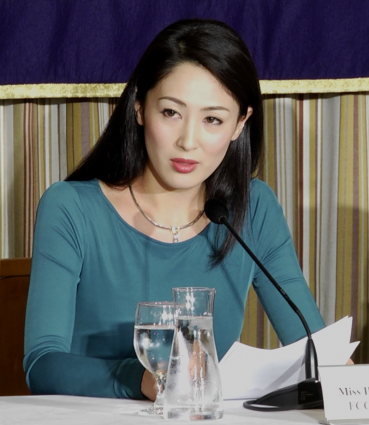What should’ve been the greatest year of her life turned into a nightmare for Ikumi Yoshimatsu. Soon after becoming Japan’s first recipient of the Miss International crown at the back end of 2012 she was allegedly being harassed and threatened by a powerful talent agency executive named Genichi Taniguchi—aka Motokazu Taniguchi—of Burning Productions. Her crime: The refusal to sign a contract with his company due to concerns over their links with the yakuza.
By Matthew Hernon
It would’ve been easy for Yoshimatsu to have simply accepted Taniguchi’s offer and toed the line as so many females have before her. Here in Japan, a nation ranked 105 out of 136 countries in terms of gender equality, it’s unheard of for a woman to come forward and publicly name her tormentor. The moral courage she has shown in doing so is both admirable and inspirational, yet concerns for her safety remain.
The Story Begins
Her first contact with Burning came in the spring of 2012. K1 founder Kazuyoshi Ishii drove her to the company headquarters where she was introduced to their notorious boss Ikuo Suho. Having heard rumors about their connections with the mafia, Yoshimatsu turned down the offer to join them and started her own agency. Undeterred, Ishii came back to see her in October. According to Yoshimatsu he interrupted a meeting, insisting that she meet with Genichi Taniguchi, who is an executive at K-Dash and president of Pearl-Dash (both of these agencies are part of the Burning Productions Group). Despite refusing, the matter was far from over and two months later she came face to face with Taniguchi for the first time at a TV studio in Tokyo.
“Those in the media criticizing the new secrecy law should properly be reporting about this lady.”
“It was on December 30 2012,” she tells Weekender over the phone. “He came in screaming, started chasing me and then finally grabbed my arm and tried to abduct me. After that he sent a private investigator to my house to look through my windows and take photos. He also tried to blackmail my family and threaten them.
For over a year now I’ve been afraid and that feeling has intensified since revealing his name in public. Nobody has done that before so of course I was really worried about it, but I realized what a huge problem this was in Japanese society and how many women live their lives in fear. I knew it was something I had to do. It was completely my own choice.”
Burning Productions are said to be one of a number of talent agencies with links to the yakuza. Yoshimatsu insists she never considered signing for them, because “once you’re part of the yakuza or a crime organization you can never leave.” Her manager Matt Taylor, who was also on the line, informs us that some stars had written to Ikumi asking about the possibility of joining her agency as they wanted out of Burning as well.
Getting out is not always easy though. It was previously reported that Glay, Japan’s seventh best selling artists of all time, were effectively blacklisted after they left Burning to go independent, while popular actress Miki Mizuno lost her role as Yukino Kashiwagi in the long-running comedy movie series Odoru Daisosasen after she quit the agency. Yoshimatsu herself was prevented from passing her crown on to her successor—the first time this has happened in 53 years.
Even her original lawyer felt she was taking too big a risk. Taylor tells Weekender that he didn’t want her to name Taniguchi publicly and was even reluctant to file a lawsuit because “he and the people that worked for his company had families and he was concerned about the potential repercussions.” Consequently, Yoshimatsu had to change her lawyer mid-stream.
Speaking Out
None of this dissuaded her from taking on Taniguchi, though. In December 2013 she sat in front of the foreign media at the Foreign Correspondents’ Club of Japan to talk in great length about her ordeal. During the press conference she gave details of some of the text messages that Taniguchi sent her. She mentioned the name Ako Kawada, a TBS reporter who she believes was being harassed by Taniguchi before committing suicide in 2008. Yoshimatsu stated that the TV executive wrote to her dad saying, “I’m worried about your daughter because your daughter would become like her [Kawada].”
Taniguchi denies the accusations, claiming that he only got in contact with Yoshimatsu’s parents because Taylor still owed him money. “I’m no stalker,” he told the Japan Times. “I called her father at least twice to try and reach her manager to solve my financial dispute with him. I have no grudge against her.”
Yoshimatsu, nonetheless, is adamant that Taniguchi has been stalking her, stating that she has the evidence to prove it, which she has presented to Shukan Bunshun.
They are one of the few Japanese media outlets to cover the story. Domestic newspapers and TV stations have chosen to stay silent on the issue, despite the fact that it has received a lot of international press. Yoshimatsu thinks the reason is obvious.
“They are afraid of losing celebrities who belong to Burning Productions,” she tells us. “There are lots of big stars who belong to that group so if they can’t have access to them it’s going to be a problem for the Japanese media. Also, Taniguchi’s an extremely powerful person who thinks he can do whatever he likes. If he orders a blackout it becomes very difficult for newspapers and TV stations to report on it. I’ve even had messages on my blog and Facebook page from journalists who said they wanted to cover it but they had to back down because they were threatened.”
The World Takes Notice
While she is “extremely disappointed” by the lack of coverage the story has received here, her spirits have been lifted by the support she has been given on various social networking sites like Facebook and Twitter, as well as her blog, which has been read by more than two million people. On top of that, her Change.org petition calling for an end to the Japanese “culture of silence” towards crimes against women has, at the time of writing, amassed nearly 120,000 signatures.
Additionally she has an extremely powerful ally in Akie Abe, wife of Prime Minister Shinzo Abe. A judge of the 2013 Miss International pageant, she received an outpouring of messages informing her of the plight of the 2012 winner. After finding out more about it and meeting Yoshimatsu in person on Christmas Day, she responded on her Facebook page: “This is last year’s Ms. International, Ikumi Yoshimatsu. Those in the media criticizing the new secrecy law should properly be reporting about this lady. I think we should join forces for the sake of all women.”
Yoshimatsu deeply appreciates the support from the First Lady. “Meeting her was a powerful Christmas present for me,” she says. “She listened to everything I’d gone through over the last year. Nobody from the International Cultural Association or the Miss International Organization told her about my situation. She felt used and embarrassed about that and decided to take down her posts about being a judge of the competition. She pledged full support to my Change.org campaign.”
The next step for Yoshimatsu is to present her petition to Mrs. Abe’s husband. She has already written the Prime Minister an open letter urging him to “establish a taskforce to investigate stalking and violence against women with the object of laying out an immediate national strategy to address these issues and offer real protection for women.” Because Prime Minister Abe has placed women’s issues as a centerpiece of his political platform, Yoshimatsu hopes that the attention that her story has received will not only lead to improvements in the way that stalking and harassment crimes against women are handled, but to new efforts and programs that will offer women a fairer chance to play an active role in Japanese society.










